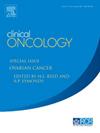Clinical Impact of Constitutional Genomic Testing on Current Breast Cancer Care
IF 3.2
3区 医学
Q2 ONCOLOGY
引用次数: 0
Abstract
The most commonly diagnosed cancer in women worldwide is cancer of the breast. Up to 20% of familial cases are attributable to pathogenic mutations in high-penetrance (BReast CAncer gene 1 [BRCA1], BRCA2, tumor protein p53 [TP53], partner and localizer of breast cancer 2 [PALB2]) or moderate-penetrance (checkpoint kinase 2 [CHEK2], Ataxia-telangiectasia mutated [ATM], RAD51C, RAD51D) breast-cancer-predisposing genes. Most of the breast-cancer-predisposing genes are involved in DNA damage repair via homologous recombination pathways. Understanding these pathways can facilitate the development of risk-reducing and therapeutic strategies. The number of breast cancer patients undergoing testing for pathogenic mutations in these genes is rapidly increasing due to various factors. Advances in multigene panel testing have led to increased detection of pathogenic mutation carriers at high risk for developing breast cancer and contralateral breast cancer. However, the lack of long-term clinical outcome data and incomplete understanding of variants, particularly for moderate-risk genes limits clinical application. In this review, we have summarized the key functions, risks, and prognosis of breast-cancer-predisposing genes listed in the National Health Service (NHS) England National Genomic Test Directory for inherited breast cancer and provide an update on current management implications including surgery, radiotherapy, systemic treatments, and post-treatment surveillance.
宪法基因组检测对当前乳腺癌治疗的临床影响。
乳腺癌是全世界妇女最常确诊的癌症。多达 20% 的家族性病例是由于高遗传率(乳腺癌基因 1 [BRCA1]、BRCA2、肿瘤蛋白 p53 [TP53]、乳腺癌伴侣和定位器 2 [PALB2])或中遗传率(检查点激酶 2 [CHEK2]、共济失调-特朗根氏症突变 [ATM]、RAD51C、RAD51D)乳腺癌易感基因的致病突变所致。大多数乳腺癌易感基因通过同源重组途径参与 DNA 损伤修复。了解这些途径有助于制定降低风险和治疗策略。由于各种因素,接受这些基因致病突变检测的乳腺癌患者人数正在迅速增加。多基因面板检测技术的进步使越来越多的人被检测出具有患乳腺癌和对侧乳腺癌高风险的致病基因突变携带者。然而,由于缺乏长期临床结果数据以及对变异的不完全了解,特别是对中度风险基因的了解,限制了临床应用。在这篇综述中,我们总结了英国国家医疗服务系统(NHS)国家遗传性乳腺癌基因组检测目录中列出的乳腺癌易感基因的主要功能、风险和预后,并提供了当前管理影响的最新信息,包括手术、放疗、系统治疗和治疗后监测。
本文章由计算机程序翻译,如有差异,请以英文原文为准。
求助全文
约1分钟内获得全文
求助全文
来源期刊

Clinical oncology
医学-肿瘤学
CiteScore
5.20
自引率
8.80%
发文量
332
审稿时长
40 days
期刊介绍:
Clinical Oncology is an International cancer journal covering all aspects of the clinical management of cancer patients, reflecting a multidisciplinary approach to therapy. Papers, editorials and reviews are published on all types of malignant disease embracing, pathology, diagnosis and treatment, including radiotherapy, chemotherapy, surgery, combined modality treatment and palliative care. Research and review papers covering epidemiology, radiobiology, radiation physics, tumour biology, and immunology are also published, together with letters to the editor, case reports and book reviews.
 求助内容:
求助内容: 应助结果提醒方式:
应助结果提醒方式:


